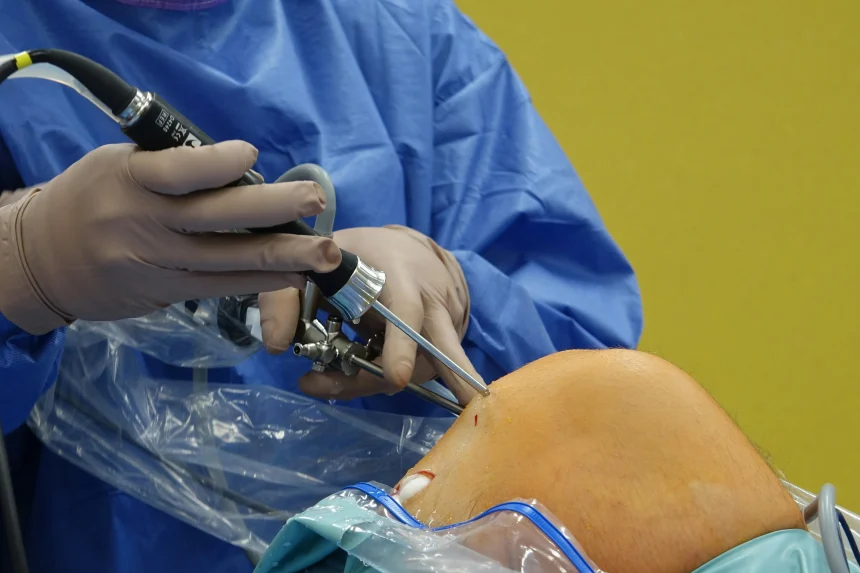Knee surgery is often a life-changing procedure, with recovery times that can vary depending on the type of surgery, the patient’s health, and the nature of the surgery. Whether you’ve had knee replacement, ACL reconstruction, or meniscus repair, the thought of traveling post-surgery might raise concerns. If you’re wondering, can I travel after knee surgery, this comprehensive guide will provide valuable insights to help you make an informed decision.
Understanding the Recovery Process After Knee Surgery
Before addressing the question of whether you can travel after knee surgery, it’s essential to understand the recovery process. Knee surgery recovery typically involves a period of rest, physical therapy, and gradual return to normal activities. Depending on the procedure, recovery time can range from a few weeks to several months.
For example, knee replacement surgery typically requires 6 to 8 weeks of rest before the patient can engage in light activities. Meanwhile, a minor arthroscopic procedure may require less recovery time. It’s essential to listen to your doctor’s advice and take it slow during the initial recovery phase to ensure optimal healing.
Post-Surgery Considerations
While you’re recovering, there are several factors to consider before making travel plans. These include:
- Pain management: Ensuring that you’re not in significant pain during travel is crucial.
- Swelling and inflammation: The knee may still be swollen post-surgery, making long periods of sitting uncomfortable.
- Blood clots: After knee surgery, patients are at a higher risk of developing blood clots, especially during extended periods of immobility, such as long flights or car rides.
- Physical therapy: Your physical therapist will guide you through exercises that can enhance your mobility. Make sure you continue this while traveling.
Given these factors, it’s important to determine if traveling soon after surgery is a wise decision for you.
When Is It Safe to Travel After Knee Surgery?
The answer to whether you can travel after knee surgery largely depends on the type of surgery, your overall health and how well you are recovering.
General Recommendations
- Consult Your Doctor: Always consult with your surgeon or healthcare provider before making travel plans. They will assess your healing progress and give personalized advice.
- Wait for Initial Healing: Most doctors recommend waiting until you’ve regained some basic mobility and pain management before traveling. For knee replacement surgery, for instance, you may need to wait for 6 to 8 weeks before embarking on long-distance travel.
Considerations for Different Types of Knee Surgery
Knee Replacement Surgery
For knee replacement surgery, the typical recovery timeline is around 6 weeks for basic mobility. However, strenuous activities such as long flights, hiking, or strenuous walking should be avoided until you are fully healed.
During the first few weeks post-surgery, you will be recovering from the trauma caused by the procedure. Swelling and discomfort are common, and traveling during this phase could potentially worsen your condition. After about 6 weeks, most patients find it comfortable to travel, but they must still be cautious with their knee and follow doctor guidelines on movement and medication.
ACL Reconstruction
Recovery after ACL reconstruction surgery can take several months. During the first 6 to 8 weeks, physical therapy and rest are essential to avoid complications. While some patients might be able to travel at this stage, it’s vital to ensure that you’re not experiencing pain, and you should be able to perform basic physical tasks like walking short distances and climbing stairs. Long-haul flights and long drives should be avoided for at least the first few months.
Meniscus Repair Surgery
Meniscus repair surgery generally requires less recovery time than knee replacement or ACL reconstruction. However, travel can still be challenging for the first 3 to 6 weeks after surgery due to limited mobility, pain, and swelling. After this period, many patients can travel short distances, but long-haul travel should be approached with caution until full recovery.
How Long Should You Wait to Travel?
There’s no one-size-fits-all answer to how long you should wait to travel after knee surgery. However, most healthcare providers recommend waiting at least 4 to 6 weeks after surgery before engaging in any long-distance travel. For some, travel might be possible earlier, but it largely depends on your recovery and mobility.
Tips for Traveling Safely After Knee Surgery
If your doctor clears you to travel after knee surgery, following certain guidelines can help you travel safely and comfortably.
1. Plan for Frequent Breaks
Whether you’re traveling by plane, train, or car, it’s important to plan for frequent breaks to stretch your legs and reduce the risk of blood clots. Getting up every 30 minutes or so during a long flight or drive can help promote circulation and relieve stiffness.
2. Take Pain Management Seriously
Pain management is a key consideration when traveling after knee surgery. Ensure that you have your medications organized and packed, including painkillers and anti-inflammatory drugs prescribed by your doctor. Don’t forget to bring any medical documentation that explains your need for medications, especially when traveling internationally.
3. Use Mobility Aids If Needed
Depending on your recovery progress, you may still need to use crutches, a knee brace, or a walker. These aids can make traveling much easier and reduce strain on your healing knee. When traveling by plane, notify the airline staff in advance to ensure you receive any necessary assistance.
4. Elevate Your Leg During Travel
Swelling is a common issue after knee surgery. To reduce swelling during travel, it’s important to elevate your leg whenever possible. On a plane, this might involve requesting extra space or using an inflatable cushion to keep your leg raised.
5. Keep Your Knee Warm and Protected
Airplane cabins can be chilly, and cold temperatures might cause discomfort or stiffness in your healing knee. Consider wearing warm, loose clothing to ensure that your knee remains comfortable during your journey.
Dealing with Long-Distance Travel
Long-distance travel presents unique challenges after knee surgery. Whether you’re flying across the country or taking a long road trip, certain precautions will help you have a safer and more comfortable trip.
Flying After Knee Surgery
Flying after knee surgery is one of the more common concerns for patients. While it is typically safe to fly once you’re cleared by your doctor, it’s essential to take extra precautions to avoid complications like blood clots or deep vein thrombosis (DVT).
Key flying tips include:
- Stay hydrated to avoid swelling.
- Move frequently to stimulate blood flow.
- Wear compression socks to reduce swelling and the risk of blood clots.
Traveling by Car After Knee Surgery
Traveling by car offers more flexibility than flying, as you can stop frequently to stretch your legs. Make sure to have a co-pilot if possible, so you don’t have to drive. Keep your leg elevated, and use seat cushions to enhance comfort.
When Should You Avoid Traveling After Knee Surgery?
There are certain situations where traveling post-knee surgery should be avoided or postponed:
- Severe Pain or Inflammation: If you’re experiencing significant pain or swelling, it’s better to delay travel until these issues subside.
- Complications with Healing: If you’re having trouble with mobility or your healing process, traveling may put unnecessary stress on your knee.
- Blood Clot Risks: If your doctor has indicated that you’re at a higher risk for blood clots, avoid long-distance travel until you are in a stable condition.
Conclusion: Can I Travel After Knee Surgery?
In conclusion, the answer to the question can I travel after knee surgery largely depends on the type of surgery you had, your recovery progress, and your overall health. While many patients are able to travel safely after knee surgery, it’s essential to consult with your doctor and wait until you’ve achieved a basic level of mobility and pain management. By following medical advice, taking precautions, and planning ahead, you can make your post-surgery travel experience comfortable and safe. Always prioritize your health and well-being to ensure that your journey doesn’t hinder your recovery.





